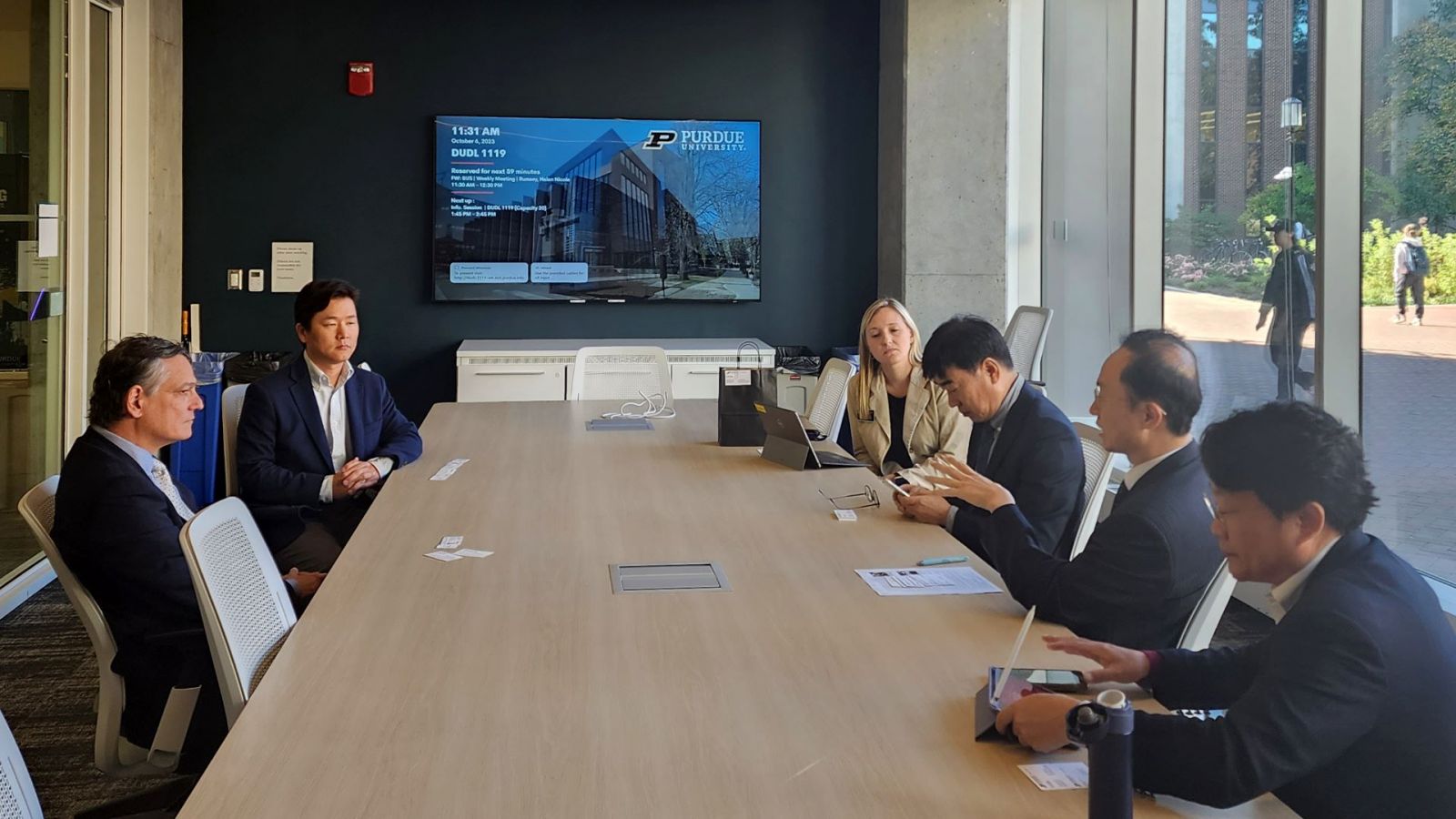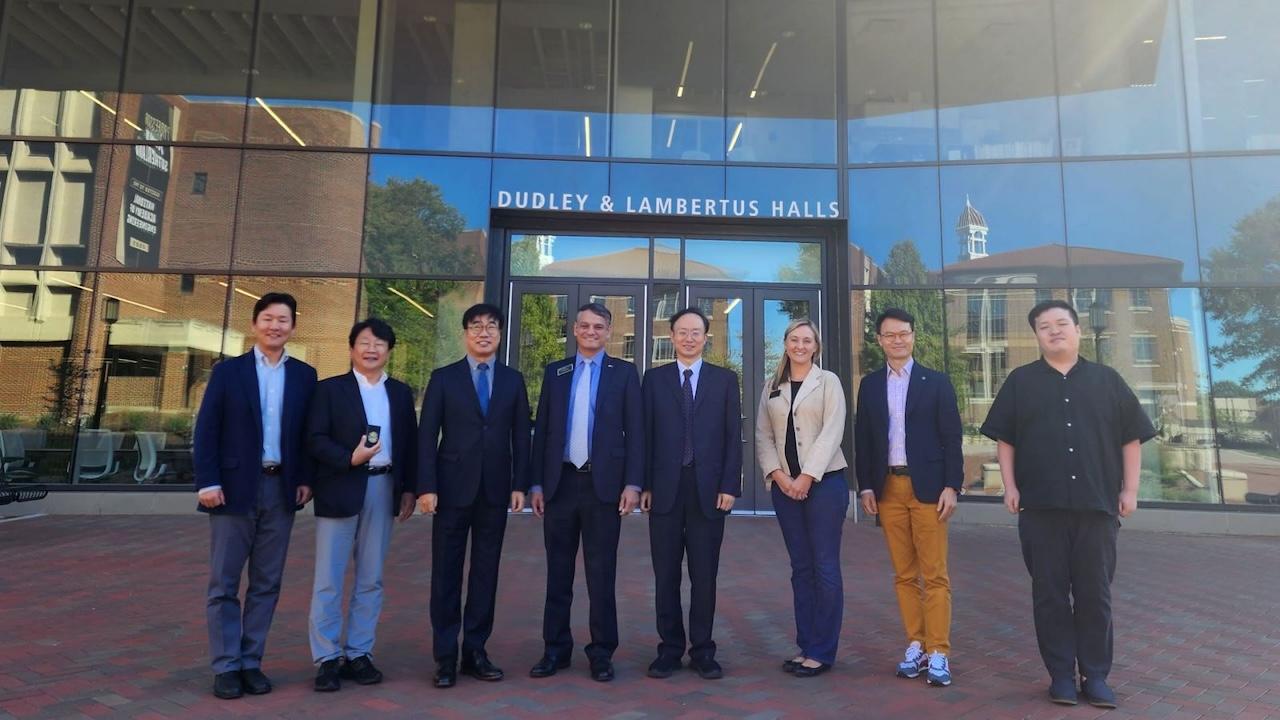Byung-Cheol Min, an associate professor in the Department of Computer and Information Technology (CIT), recently hosted a delegation from two South Korean organizations, The delegation and Min planned a bilateral symposium and discussed strategic partnerships between the organizations and Purdue University.
The delegates came from Daegu Gyeongbuk Institute of Science and Technology (DGIST), a leading research-oriented university in South Korea, and the Korean Auto-vehicle Safety Association (KASA), an organization focused on promoting safety in the automotive industry in Korea. Jinung An, a DGIST professor, helped facilitate discussions between Purdue and the delegation.
DGIST and KASA
- DGIST is known for its focus on cutting-edge technologies and innovations. DGIST and Purdue University have opportunities to collaborate on research in the fields of robotics, mobility, and healthcare, where both institutions possess expertise. Joint research projects could also leverage the strengths of both institutions to address global challenges related to AI, mobility, and robotics.
- With KASA’s focus on automotive safety, it could collaborate with Purdue on research in the areas of transportation safety, emergency medical systems, future mobility, vehicle design, crash testing, and biomedical research related to automotive safety.

During the visit, the delegation met with various members of the Polytechnic, including Daniel Castro-Lacouture, dean; Justin Yang, associate dean for research; and Elizabeth Barajas, director of globalization. Min says the visit indicates the organizations’ recognition of Purdue as a leading institution with a global reputation for excellence in education and research.
“South Korea continues to be a sought-after destination for academic experiences for both Purdue students and faculty,” Barajas said. “Future collaborations with DGIST and the KASA group will most definitely fill a need and enhance international opportunities and research within the Polytechnic.”
Min believes the visit has also encouraged collaboration among faculty members, which can benefit Purdue’s global research projects and foster innovation in various academic disciplines.
“DGIST’s emphasis on interdisciplinary studies aligns with Polytechnic’s commitment to interdisciplinary education and research,” Min said. “Collaborative initiatives often involve networking opportunities with professionals and experts from different regions. This can lead to valuable connections, internships, and future career prospects for Polytechnic students.”
These potential partnerships could expose Polytechnic students to a more globalized academic and cultural environment where they can interact with international faculty, researchers, and peers. Castro also noted a collaboration between Purdue and DGIST would offer a unique and enriching capstone experience with hands-on learning opportunities.
“Bringing together faculty from both institutions in a collaborative workshop setting enhances our ability to share best practices, explore new teaching methodologies, and identify areas of potential research collaboration,” Castro said. “This exchange of ideas will contribute not only to the professional development of our faculty members but also to the overall academic excellence of both Purdue Polytechnic and DGIST.”
“This visit has established a solid groundwork for future partnerships to enhance technology and education,” Yang said. “We are hopeful about the possibilities this collaboration presents and look forward to continuing to nurture this relationship.”
DGIST and Purdue Polytechnic are preparing for a bilateral symposium focused on mobility and healthcare in the summer of 2024, which will be held at DGIST in South Korea. They plan to exchange knowledge and technologies, explore new research areas to pursue together, and lay the groundwork for future collaboration. Min says they will also prepare a letter of intent with DGIST, which will formalize their collaboration and facilitate discussions about future work.
Min says they also plan to conduct joint research focused on the emergency medical system with KASA, and efforts are being made to expand collaboration beyond universities to involve Chungbuk Province and the state of Indiana.
Because the DGIST and KASA collaboration encompasses AI, robotics and mobilities, their Polytechnic partnership serves the Purdue Computes initiative, which emphasizes physical artificial intelligence.
Additional information



